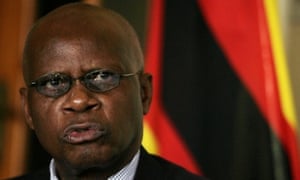Ruling Zanu-PF accuses US delegate of fomenting unrest ahead of planned anti-corruption demonstrations

Zimbabwe’s ruling party has threatened the US ambassador with expulsion, amid an intensifying crackdown on opposition and union activists ahead of planned anti-corruption demonstrations on Friday.
Officials from the Zanu-PF called ambassador Brian Nichols “a thug” who was fomenting unrest by funding protest organisers.
The accusation came as police published a “wanted list” of 14 prominent critics of the government including trade unionist Peter Mutasa, opposition legislator Job Sikhala and two former youth leaders of the ruling Zanu-PF party.
Patrick Chinamasa, the spokesperson for Zanu-PF, said Nichols and a “coterie of gangsters” should stop “mobilising and funding disturbances, coordinating violence and training insurgency. Our leadership will not hesitate to give him marching orders.”
“Diplomats should not behave like thugs, and Brian Nichols is a thug,” Chinamasa said.
The outburst follows criticism from the US and other western powers of last week’s arrests of opposition politician Jacob Ngarivhume and journalist Hopewell Chin’ono, who has been an outspoken critic of corruption under President Emmerson Mnangagwa’s rule.
Chin’ono recently published documents raising concerns that powerful individuals in Zimbabwe were profiting from multimillion-dollar deals for essential supplies to fight the coronavirus pandemic.
The 49-year-old journalist is now in prison awaiting trial for incitement to public violence by promoting the planned protests which police say will turn violent.
Both Chin’ono and Ngarivhume, who face similar charges, deny any wrongdoing and could face up to 10 years in prison if convicted.
The arrests were also criticised by the UN and campaign groups such as Amnesty International.
Monica Mutsvangwa, the information minister, said at the weekend the two men had sought to overthrow Zimbabwe’s government in collusion with the US and unnamed western powers.
Similar accusations were systematically levelled for much of the rule of Robert Mugabe, the dictatorial former ruler who was ousted in a military takeover in 2017.
Mugabe’s fall raised fleeting hopes of reform and a potential diplomatic rehabilitation for the former British colony. Without better relations with the US, there is little hope of a desperately needed economic bailout for the heavily indebted state.
As the economic situation in Zimbabwe has deteriorated in recent months, there has been a surge of repression, and a series of abductions of government critics. Many detainees have been assaulted, humiliated or threatened and several have been told not to criticise the government.
Millions in Zimbabwe face acute shortages of basic foodstuffs as prices soar. The country is also facing a looming health crisis as Covid-19 cases increase.
This has made the government particularly sensitive to accusations of corruption.
Chinamasa also issued what appeared to be a call for vigilante action, telling government supporters to “use any means necessary” if there was disorder during the protests planned for Friday.
“Don’t ask for permission from anybody, it’s your constitutional and legal right. Don’t be sitting ducks … phoning us. No, this time no, use any means at your disposal to defend yourselves. We are reminding our people that self-defence is a right especially when your security is under threat from these violent so-called protesters,” Chinamasa said.
Despite the country’s problems, Zimbabwe’s divided opposition has yet to mobilise a mass protest movement.
Fadzayi Mahere, the spokesperson of the main opposition party, the Movement for Democratic Change, told the Guardian that the publication of a wanted list by the police ahead of the protests was an “attempt to intimidate citizens who have expressed an intention to demonstrate peacefully”.
“The clampdown … is the latest in a series of attacks by the state in an attempt to stifle the main opposition, further shrink the democratic space and distract attention from the national crisis and governance failure of Mr Mnangagwa. The state is at war with its citizens.”
The health minister, Obadiah Moyo, was charged last month in connection with the awarding of a $60m (£47m) contract to a company that allegedly sold Covid-19 supplies to the government at inflated prices.
COMMENTS